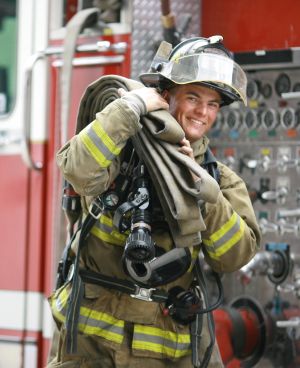Fire Science

Associate of Science (AS)
Discover the exciting world of Fire Science and emergency services! You will learn skills to help protect your community by responding to fires and life-threatening emergencies. Firefighters must be able to crawl into smoke charged buildings with temperatures of 800 degrees, rescue victims from twisted remains of a vehicle, or rappel and navigate down rocky terrain. This career exposes you to the adrenaline rushes of emergency service while providing a team-oriented, stable, and respectable career. In fact, a Harris Poll discovered the public views careers in firefighting as one of the most respectable career fields. Firefighters experience a unique opportunity to interact closely with their community, and the ability to educate the public and work with diverse populations is very important in order to be successful. The Fire Science field also provides extensive opportunities for career advancement. The City College Fire Science program is International Fire Service Accreditation Congress (IFSAC) Degree Assembly accredited.
Cost of Attendance
Firefighters
| Median Wage (MT)* | $64,020 yearly |
| $30.78 per hour | |
|
|
|
| Median Wage (US)* | $59,530 yearly |
|
$28.62 per hour |
|
|
*Bureau of Labor Statistics, Office of Employment Projections; MT Dept. of Labor and Industry, Research and Analysis Bureau 2024 |
|
With a Fire Science degree, you will find employment in a variety of settings, such as:
- Structure Firefighter- volunteer, combination, and career fire departments
- Crash Rescue Firefighter
- Wildland Firefighter
- Fire Prevention and Public Education
- Hazardous Materials Technician
- Emergency Response Teams - Oil & Gas Industries
Examples of where recent City College graduates are working:
- City of Billings Fire Dept., Billings, MT
- Custer County, Miles City, MT
- American Medical Response, Billings, MT
- Columbus Fire Dept., Columbus, MT
- Red Lodge Fire & Rescue Dept., Red Lodge, MT
- College Station Fire Dept., College Station, TX
- Sioux Falls Fire Dept., Sioux Falls, SD
- U.S. Forest Service, Libby, MT
- Lewistown Fire Dept., Lewistown, MT
- Livingston Fire Dept.,Livingston, MT
Classes will be offered in on-campus and online formats at both campuses of MSU Billings.
ADMISSION TO CITY COLLEGE
- First-time college students must have high school diplomas from an accredited high school, a GED/HiSET, or passed the MSUB Readiness Exam offered through our university.
- Transfer students will need to submit records from all regionally accredited institutions.
Montana State University Billings is accredited by the Northwest Commission of Colleges and Universities (NWCCU).

Upon completion of an Associate of Science degree in Fire Science at City College, students may transfer to Montana State University Billings and complete a Bachelor of Science degree. Please contact the MSU Billings Advising Center at 406-657-2240 for further details.
Q: How do I know if firefighting is a good fit for me?
A: These are characteristics typically found in fire and emergency services personnel:
- Honest with themselves, their team, and the public
- Compassionate and kind in caring for those they serve
- Mentally, emotionally, and physically healthy and balanced
- Strong team players and they enjoy working as members of a crew
- Hands-on doers who are comfortable and happy being outdoors
- Stress tolerant and able to work in dangerous and changing situations
- Willing to risk their lives, in a highly calculated manner, to save “savable” lives
Q: What will I learn in this program?
A: In the Fire Science AS program, you will learn:
- Safe, standards-based, entry-level firefighting skills
- Principles of followership and leadership
- How to be a resilient Firefighter
- Incident command and fireground strategy and tactics
- Modern fire behavior, science, and application
- Principles of air management, crew resource management, and firefighter safety
- How to safely control, contain, and confine hazardous materials incidents
- National standards in wildland firefighting
- Why it’s important to develop proactive fire prevention and public education programs
- How firefighters learn and how to instruct firefighters
Q: Does EMT training count towards my Fire Science Degree?
A: Yes, it can count towards some of your general education requirements.
Most fire and emergency service agencies will require a prospective candidate to possess a valid, National Registry Emergency Medical Technician (EMT) certificate prior to participating in their hiring process. City College at Montana State University Billings does not offer an EMT course. Students are strongly encouraged to complete a National Registry EMT course prior to completing their Fire Science degree.
Students with a valid, National Registry EMT certificate may use the certificate to waive three (3) credits of life science and three (3) credits of social science.
Students are welcome to complete a National Registry EMT course from a variety of providers around the country, including the student's home state. At present, the following National Registry EMT providers have a history of offering courses in Montana and students are encouraged to reach out to them:
- Aerie Backcountry Medicine, (406)-542-9972
- Beartooth EMS & Rescue, (406)-579-7248
- Best Practices Medicine, 1-800-276-6123
- Big Horn Fire Company, (406) 581-0412
- Big Sky EMS, (406) 670-5021
- Bitterroot College, (406) 375-0100
- Fight or Flight Emergency Medical Educators, (304) 543-6208
- Flathead Valley Community College (Montana), (406) 756-3822
- Great Falls College, Montana State University, (406)-771-4300
- Inter Mountain Medical Educators, (406)-581-7032
- Missoula Emergency Services, (406)-549-2325
- National Outdoor Leadership School, 1- 800-710-6657
Please visit the National Registry of Emergency Medical Technicians more information: https://www.nremt.org/
